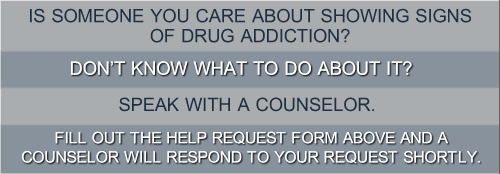- Navigation
- Home
- Causes Of Drug Addiction
- Drug Addiction And Detox
- Drug Addiction Intervention
- Drug Addiction Statistics
- Drug Addiction Treatment
- Drug Withdrawal Symptoms
- Effects Of Drug Addiction
- Facts About Drug Addiction
- Opiate Addiction
- Prescription Drug Addiction
- Teen Drug Addiction
- What Is Drug Addiction

Identifying The Signs of Drug Addiction
A Very Quick Introduction To Drug Addiction
Drug addiction is defined by an user wanting to take a drug without taking into account the negative consequences that the user's intake of drugs might be having on different parts of their life, including their mental and physical health, their relationships and their vocational lives. In some cases, drug addiction might indirectly or directly contribute to the death of the user and the detriment of those that surround the user and those around him or her.
Effects and signs of drug abuse vary widely depending on the drug that the user has taken. Some drugs are purely psychologically addictive, whereas others are physically addictive. Drugs do not have to be illegal to be addictive - some of the most addictive drugs are nicotine and caffeine. Other psychologically addictive drugs can be very devastating to the users' health and environment.
Drugs are substances that make the user's body and mind change. Drugs can be used to treat diseases and for recreational purposes. Some drugs have addictive properties that can make those most vulnerable to them become drug dependent or drug addicted.
Addiction is a complicated topic that greatly affects users and their loved ones. There is still a lot of research being done on what exactly causes addiction and whether there is a genetic element to it at all. Addiction is not considered to be a predictable effect of drug use, even prescription drug use, but drug dependency might turn into drug addiction.
If you believe that you or someone you are close might be suffering from drug addiction, seek mental health help. Only a qualified mental health professional can tell you or your loved one whether you are suffering from drug addiction and what the treatment options are for you or your loved ones.
What Are The Signs of Drug Addiction?
The signs of drug addiction can change between each individual. Common signs of drug addiction can be constant drug seeking, loss in motivation, and may take more drugs because the user wants to avoid unpleasant withdrawal symptoms, although this does not necessarily mean that the user is addicted.
There are some other signs of drug addiction. Users may taking drugs in dangerous situations and putting themselves in dangerous situations after taking drugs This might cause risky sexual behavior or could cause the user to start driving even while not sober, which not only puts him or her in danger but also those around. Essentially, the individual does not think that he or she is doing anything wrong and, in an altered state of mind, might not think of these things as problems. Unfortunately, these can carry terrible consequences with them like a permanent record, jail time and in some cases even death.
For instance, a drug addicted user might know that something is dangerous but still need to feel the effects of the drug when the user feels sober. The user might also feel like he or she has lost control over their drug use and that their lives revolve around the drug use. This might mean that the users stop doing several activities that they might have used to enjoy. The user might also experience a decrease in performance at work or in school. The user might also stop socializing and might give up on hobbies that he or she used to enjoy. These are all signs that the drug user might have become addicted to his or her drug of choice.
It is important to note that some of the most addictive drugs are prescription opiates. Discuss this with your doctor if you are worried about becoming addicted to a prescription opiate. Drug addiction can lead to detrimental long term effects in the user's mental and physical health, including disturbances in sleep patterns, mental processes and may even cause long term mental health disorders.
Some of the signs of drug addiction that are visible to those close to the user might be extreme changes in weight, change in appetite, constant red or itchy eyes, strange or unusual smells on the user's body, hair, clothes and things, including living space, impaired coordination, tremors and possibly shaking, as well as constant lethargy or feelings of hyperactivity. The user might experience changes in personality and attitude, sudden mood swings, irritability, anxiety and paranoia for no apparent reasons. Other signs of drug addiction are financial issues and constant money borrowing. Some users may even turn to stealing from those closest to them. The user might suddenly change where he or she wants to go for fun, his or her entire social circle and appear withdrawn and sullen.
What Are The Signs of Addiction To Specific Drugs?
Depending on the drug that the user is addicted to, the signs that those around them see can be different. Addiction is a difficult and complicated problem that only trained professionals can treat. Do not try to bribe those that might be addicted - make sure that you contact a drug addiction counselor before you attempt to talk to a loved one that you think might have a problem with drug addiction. It is also important to note that not all addiction is the same and some users might be addicted psychologically, while other users might be addicted physically. A physical addiction also has a certain degree of psychological addiction in it.
With marijuana, the user might have glassy or red eyes, become irritable, start sleeping too much and have a disturbed sleep schedule, loss of interest in things around them and loss of motivation. Heroin may cause contracted pupils, disturbed sleeping schedule and sleeping from and to odd times, needle marks in parts of the skin covered by clothes, sweating, twitching and loss of appetite. Stimulants may cause hyperactivity and anxiety, along with irritability and depression. It might also cause dry mouth. These stimulants may be cocaine, crystal meth and amphetamines. Hallucinogens may cause the user to see hallucinations, strange or erratic behavior, hyperactivity and mood swings, along with slurred speech.
- Questions?
